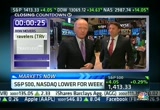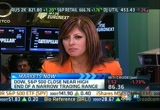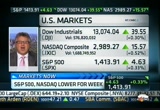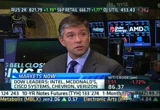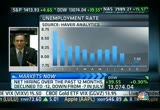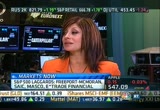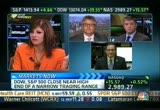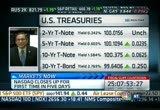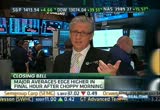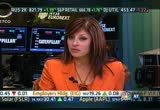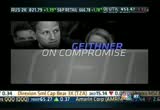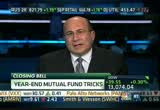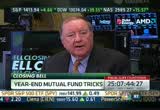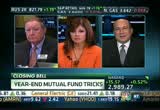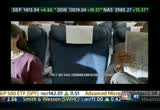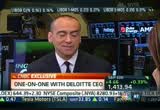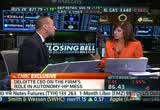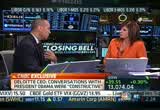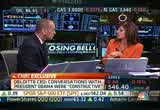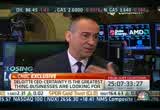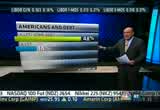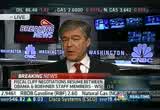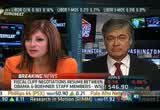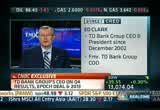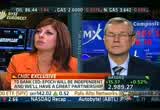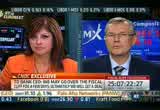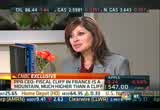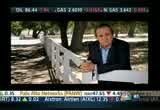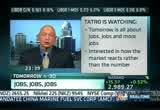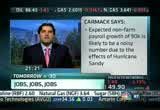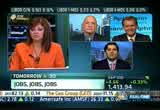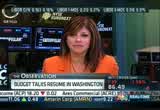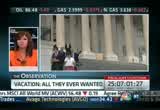tv Closing Bell With Maria Bartiromo CNBC December 6, 2012 4:00pm-5:00pm EST
4:00 pm
market. >> bigger fish to fry. >> at this point we do. >> even though the expectation is for growth of 220,000, but that sounds high. we'll see. thank you, michael. see you later. going out just off the highs of the session with the dow up about 35 points. stay tuned. much more to come now. don't forget, we'll have coverage of the jobs number out tomorrow morning at 8:30 a.m. eastern time here on cnbc. here's the second hour of "the closing bell" now with my dear friend maria bartiromo. i'll see you tomorrow. and it is 4:00 on wall street. do you know where your money is? hi, everybody. welcome back to "the closing bell." i'm maria bartiromo on the floor of the new york stock exchange. stock prices on wall street modestly higher today i did spite no sign of a deal on the fiscal cliff. take a look how we're settling out this thursday afternoon on wall street. the industrial average at 13,074. the s&p up just a fraction. will the markets get a boost
4:01 pm
from another cash infusion? ben pace says he's expecting the federal reserve to announce another round of stimulus at the meeting next week. is that what the markets really want right now? ben pace joins me along with chris heize and rick santelli. ben, let's talk fed policy. you think the fed announces qe-4 next week? >> i think it's the fact the twist operation is ending at the ends of the year, and they don't feel compelled to incrementally tighten that. that means it has to be replaced. that's the qe-4, the fact they'll continue to buy to continue to be just as easy as they've been since the september 16th qe- 3 announcement. >> so you think it's a continuation. what's the impact on the market, do you think? is it priced in? are we expecting that? what do you think? >> i think it's generally priced in. the thing that concerns me the
4:02 pm
most is the effectiveness of monetary policy here is starting to get less and less as time goes on. the shock and awe impact we haven't really seen. it's more of a fiscal problem right now. the monetary authorities have done pretty much what they can. the fiscal authorities have to get together and find a solution. >> chris, what do you think? how are you navigating this anticipation of the fiscal cliff and beyond? >> i think ben is on to something in terms of the effectiveness of it. over the last few years, monetary policy was a catalyst to move money into the marke on a capital allocation basis. you saw the jolt in the market, then it plateaued. heading into next yeerar, monety policy becomes part of the base. the jolt is fiscal policy. a little transparency on that front. the big switch is on. i think they going to use more words than action. >> they've been using that very effectively. and it actually moves markets. just the language. >> he didn't buy one bond.
4:03 pm
he said three words and spanish and italian yields drops three basis points. >> what were the three words? >> whatever it takes. >> that's good. markets like whatever it takes, i guess. rick santelli, loeet's talk job. that's tomorrow. some noise in this report. early thanksgiving, hurricane sandy. is this rally at the end of the day having anything to do with any anticipation of the jobs report? what are you looking for? >> no, i don't think so. we're looking for almost exactly half. we had 171,000. the consensus is 85 to 90,000. we're looking at half. i understand that, you know, superstorm san difs a horrible event, and i am sure it's going to take some jobs out, but it's going to also be a bit of an excusetrending well. i'll give you an example. wells fargo gallup does a small survey. on hiring, small businesses dropped to the lowest level of
4:04 pm
opt miimism in four years. it doesn't matter what ben bernanke does. i think his programs have long since not really helped the employment side, but the fiscal cliff is doing obvious damage. that's going to make what everybody knows is coming. we ran out of two years to sell. they're going to go from a twist to outright purchases. it's fully built into the market, but it isn't going to help. the fiscal cliff is going to do more damage to the psyche of job creation than anything that ben bernanke can do. >> any expectations in terms of the jobs numbers? what do you look for? >> we're looking for better than expected. rit, the sandy effect will be there. you should see actually better job growth next year, and that also becomes that second catalyst into the marketplace that could put the s&p at an all-time high next year. >> what about the fiscal cliff though? if we take out the mortgage
4:05 pm
deduction, which is being hotly debated in terms of the exemptions and loopholes, does that stop this housing recovery in its tracks? >> if you pick a midpoint between 0% and 3.5% and call it a fiscal slope, 1.5% drag next year is equivalent to the drag we have this year from the overall private sector. without housing as a major tail wind. next year housing should be closer to a major tail wind. there's a little bit of a buffer zone there. >> ben, what about you? you think -- are you worried about the cliff? >> yeah, i think you have to be. it's one of the reasons we took a little risk out of our portfolio. we think there will be a resolution, a grand bargain the at the end of the process that will take some gdp growth off of 2013, but not that much. not that much to derail what we think will be positive risk asset markets in 2013. >> all right. how do you want to be allocating capital? the money, of course, recently just in the last couple trading sessions has moved into
4:06 pm
financials. is this an area you would step into? what do you think? >> we're market weight the overall financial sector. it is underowned. it's underloved. money coming in is going to propel the prices a little higher. the housing turn is real. if you see the transparency rise next year, multiples should rise on 108 earnings. you're looking at 1600. should benefit the financials. energy is a wild card next year. that's what we should be allocating. >> rick, if we go over the fiscal cliff, you have to believe there will be a lot of hoarding of assets, sitting on money. maybe we get more action and fixed income. >> i think what nobody is talking about, you with allude to it constantly, and i'm in your camp. the damage is done. it's evident by many of these reports. even if they come up with a 13th hour settlement, even if they come up with good reform, some of the adjustments that have already been made or have been in the process of being made have already done a lot of
4:07 pm
damage that we didn't need. we already shot ourselves in the foot on this one. in terms of housing, you know, the shadow inventory that's been tied up in litigation, we could see as many as 20 million of those come on the market in 2013. even though i agree with the guest, there's a lot of different forms of the housing market. some of them are going to be under pressure due to this avalanche of shadowed foreclosure in 2013. >> ben, the groups you want to own in 2013 are what? >> from an overall asset allocation perspective, we like emerging marketing wetiequities. i still think high yield and emerging market debt are two good asset classes. we would stay overweight commodities. >> all right, we'll leave it there. gentlemen, good conversation. up next, apple rebounding after yesterday's big selloff. i want to get to bob here with a look at the big moves before we take a break. over to you, bob. >> we hit the one-month high on the dow, maria, led by some of the tech stocks like ibm and
4:08 pm
intel. apple was the big story. we ended positive, but just barely. apple, $50 lost in the last two days. today, huge volume. 40 million shares. that's twice normal. company telling nbc, brian williams, they'll start building some mac computer lines here in the united states. big interview on that tonight. let's take a look at some of the computer hardware stocks. nice turn around. remember that disaster with dell and hewlett a few weeks ago? they've been moving up in the last several days. look at this move and this turn around. apple to the downside. all the others in the month of december to the up side. how about the airlines? new high for the airline index. jet fuel costs are low. capacity is constrained. i'm hearing booking is returning to normal after sandy, after a hit for them. those stocks up. u.s. airways up. southwest has been on fire recently. finally, the insurers. first down day in a long time. in the last couple weeks, generally all of them have been to the up side. this is the first down day in about two weeks. back to you.
4:09 pm
>> thank you so much, bob. watch out for year end window dressing. we're not talking about the lovely holiday displays. we're talking about what some money managers do to their portfolios to drum up better returns. then -- >> we relied on audited financials. not exactly brand x accounting firm. >> hewlett-packard ceo meg whitman putting d, liotte in the line of fire. the ceo will sit down with us. finds out from the ceo of ppr about what he's expecting for christmas. you're watching "the closing bell" on cnbc, first in business worldwide. if we want to improve our schools... ... what should we invest in? maybe new buildings? what about updated equipment? they can help, but recent research shows...
4:10 pm
... nothing transforms schools like investing in advanced teacher education. let's build a strong foundation. let's invest in our teachers so they can inspire our students. let's solve this. try running four.ning a restaurant is hard, fortunately we've got ink. it gives us 5x the rewards on our internet, phone charges and cable, plus at office supply stores. rewards we put right back into our business. this is the only thing we've ever wanted to do and ink helps us do it. make your mark with ink from chase.
4:12 pm
4:13 pm
yearly returns. joining us to protect your money and the risk, understanding the risk better, is ronn ensana. good to see you. what exactly is window dressing? let's get right to the source of this issue. we see it every year. explain it. >> if depends. we've been doing this for 28 years together. when we first started talking about it, it was a way for a portfolio manager not to look dumb. this is what they're talking about in "the wall street journal" today. this is the viagra for portfolio managers. you buy that stock, sell it when the quarter ends, and boost your returns and.
4:14 pm
ly your f-- and potentially you. >> what do you think, art? >> the problem is that if you're a regulator and you come in and say, ron, why did you buy so much of that stock in the final ten minutes? he would report, because i like it. i already own it. you see how much i like it because i own it. that was the primary defense. you haven't seen a great many big prosecutions in this area. interestingly enough, one of the areas that they did, oh, about 25 years ago, prosecute some folks on was running a options portfolio. they marked the stock up to make the options more attractive so they got a bigger bonus from their firm. >> they closed the stock on the strike too, right, art? >> absolutely. >> the options owners wouldn't make any money. >> that's right. >> are you expecting, ron, that we're going to see various sort of techniques at year end to make the portfolios look better? >> i think now that this has become so public with "the wall street journal" article, it focuses on the movement of very
4:15 pm
thinly traded stocks. one thing to watch out for is they don't invest in this microcap world that is so easily pushed around. they were talking about one stock in the article that had a market value of $36 million. any individual can move a stock with that kind of market cap. you want to stay away from funds that invest in those types of securities. you don't want to necessarily trade them yourself, because you can be on the wrong side of that trade as the manager in question may be taking advantage of your position on the other side. >> so it sounds like the both of you are not really necessarily seeing a big impact from this right now. >> no, i don't think so. i will tell you over the years general market conditions can work against you. you might want to move something up, but if it's a bad i did fda the market, sometimes window dressing with look like window washes or window breaking. >> that's funny. art, you wrote today about what we're seeing in terms of tax changes and withholding. talk to us about that. >> the fiscal cliff, one of the things if we're really going to
4:16 pm
go over it and change the tax basis, the treasury has to call on corporate america to change the withholding tables. all of us get taxes withheld. if they're going to change what rate i'm going to be taxed at, they're going to have to change that table. that's not an overnight process. certainly, the treasury can't afford to let that go too long because everybody will be underwithheld. they'll get a big tax bill. there will be a riot among the people if that happens. what i'm watching is the treasury. if they get nervous enough, they'll ask them to change the tax tables. so far it looks like they smell a deal and haven't asked for it yet. you think we're going to get a deal? >> i think they may try to push it to the end. the other thing i'm watching for is the 17th when the president is due to take his family to hawaii. i don't think he wants to be in hawaii without a deal. something is going to come up. >> ron, what about you? >> i thought the resignation of senator jim demint, who was a staunch conservative, which was
4:17 pm
a surprise departure, tells me the republicans in many ways are throwing in the towel on this deal. he's a guy who fought tooth and nail against this thing, against raising tax rates. you may want to work from the outside in, which is the way the press is portraying this. it looks like too many republicans are beginning to throw in the towel. they may finds a compromise that isn't necessarily clinton era tax rates, something in between. but it looks like the makings of a deal. with every change on the republican side, more and more likely to happen than not. >> all right. we'll see about that. we'll be watching. obviously, very, very important for the markets. thanks. see you later. let's get to bertha coombs. one company with big moves after the bell. over to you. >> maria, amarin is falling after the bell. some had suspected them to solicit a bid to buy itself out. it has a drug that's a fish oil drug that's prescription. they say they're hiring a sales staff and they still expect to present more details to the fda in february 2013.
4:18 pm
some disappointment, clearly, there. maria. >> thanks so much, bertha. we'll keep watching that. up next, the stock market and america. steve liesman up next with surprising new results from the exclusive cnbc survey. and then as the lawsuits fly over hewlett-packard's autonomy mess, i'll talk with the ceo of deloitte and their role in looking over the books. ally bank. why they have a raise your rate cd. tonight our guest, thomas sargent.
4:19 pm
nobel laureate in economics, and one of the most cited economists in the world. professor sargent, can you tell me what cd rates will be in two years? no. if he can't, no one can. that's why ally has a raise your rate cd. ally bank. your money needs an ally. tdd#: 1-800-345-2550 this morning, i'm going to trade in hong kong. tdd#: 1-800-345-2550 after that, it's on to germany.
4:20 pm
tdd#: 1-800-345-2550 then tonight, i'm trading 9500 miles away in japan. tdd#: 1-800-345-2550 with the new global account from schwab, tdd#: 1-800-345-2550 i hunt down opportunities around the world tdd#: 1-800-345-2550 as if i'm right there. tdd#: 1-800-345-2550 and i'm in total control because i can trade tdd#: 1-800-345-2550 directly online in 12 markets in their local currencies. tdd#: 1-800-345-2550 i use their global research to get an edge. tdd#: 1-800-345-2550 their equity ratings show me how schwab tdd#: 1-800-345-2550 rates specific foreign stocks tdd#: 1-800-345-2550 based on things like fundamentals, momentum and risk. tdd#: 1-800-345-2550 and i also have access to independent tdd#: 1-800-345-2550 firms like ned davis research tdd#: 1-800-345-2550 and economist intelligence unit. tdd#: 1-800-345-2550 plus, i can talk to their global specialists 24/7. tdd#: 1-800-345-2550 and trade in my global account commission-free tdd#: 1-800-345-2550 through march 2013. tdd#: 1-800-345-2550 best part... no jet lag. tdd#: 1-800-345-2550 call 1-877-561-5445 tdd#: 1-800-345-2550 and a global specialist tdd#: 1-800-345-2550 will help you get started today. welcome back.
4:21 pm
deloitte ceo was among the chief executives who met with president obama last week and called the conversations, quote, constructive. since then, not much progress has been made. we want to talk more about that exclusively. he's here with me to talk if he still feels that way about fiscal cliff. good to have you on the program. deloitte ceo. thanks so much for joining us. >> thanks for having me. >> i want to get to the president and your meeting and really zero in on the fiscal cliff. before we do that, i want to get to the situation around hewlett-packard and autonomy. of course, hp taking a massive write down on the acquisition of autonomy. ceo meg whitman throwing deloitte under the bus in some sense because the firm was among those charged with examining the books before the deal. what can you tell us about what you did in terms of overseeing the books at autonomy and what do you say now that she's charging this fraud? >> sure, maria. unfortunately for us, that matter has been turn the over to investigation and the
4:22 pm
authorities. believe it or not, that's one of the things i'm not on the hot seat about. that's part of the u.k. member firm. >> of course, this is an issue at the form. it's a big deal. >> it's important to us. unfortunately, we can't comment on that. our member firm has put out a statement. we believe we held up to professional standards. >> during that time, there was no questioning on the part of hewlett-packard in terms of saying, hey, did you find anything? it just seems like it came up from nothing. now all the sudden it's fraud with this $8 billion write down. >> again, i can't comment on it. i wish i could, but i cannot. >> all right. let me move on to your meeting with the president about the fiscal cliff. >> sure. it was optimistic. president very inclusive of business. he was open to a broad set of solutions that included all aspects, not just revenue, but spending and entitlement reform. >> so you actually felt that you saw a difference. you say it wasn't always like that. you saw a difference in the president in terms of listening
4:23 pm
and perhaps taking advice on what's to be done fiscally? >> the president had made comments he was trying to embrace the business community. he was very constructive. >> where do you think we come out on the fiscal cliff? are you expecting the economy to go over the fiscal cliff and see these taxes go high hadder and spending cuts take effect? >> my personal view is i'm still optimistic. i think the conversation has been constructive since. do we have a solution on the table yet? no. but i'm optimistic we'll get to a framework. >> why? >> there's been enough dialogue. there's been movement. everyone seems to recognize the problem. everybody realizes there has to be a revenue component, spend component, entitlement reform component. for us, the business community and all the ceos, certainty is the greatest stimulus for us. >> do you support tax rates
4:24 pm
going higher? >> me personally, as an individual, more importantly the business community, which i'm part of. we support something inclusive. if rates were higher in a videocasset vacuum, i'm not sure we'd be supportive of that. we have to make sure the consumers, those who spends a lot of the dollars, the middle class, are protected in this exercise. >> i guess the question i'm really getting at is, do you get the revenue from tax increases or from broadening the tax code? do you have an opinion on that? >> i think what has to happen, it will wind up both in a compromise. you have to get to some number that's at least three to one on spend to revenue. to do that, you're going to have to do more than just one of those items. >> what are you hearing from clients these days in terms of where their business stands in terms of what their outlook is for 2013? you're dealing with executives of all sorts of businesses, very diversified set of businesses. so what are you hearing from
4:25 pm
those management teams? >> yeah, first of all, certainty. why? because a lot of them are finishing up their plans. they already finished up their plans for calendar year 2013. certain city tty is the greates we're looking for. getting to a solution almost seems to be as important or more important than the solution itself. you need to know what the plan is. >> what are they saying in terms of 2013? what's the outlook? >> the outlook is as reported. if we go over the cliff, the outlook is less optimistic, obviously. will it be like it was back in 2007? i don't think that's the case. it won't be positive. growth will stymy. it becomes a problem. >> of course, we know businesses today have got, what, $3.6 trillion in cash on balance sheets. are you expecting that cash to go to work in 2013? how will folks allocate that money? >> one of the things that has to happen, based on what we see
4:26 pm
from want cliethe clients we se there was tax reform, that would accelerate moving that cash. certainty first, tax reform second. >> i guess that's what i'm trying to get at. what are you hearing in terms of executives in terms of what they're going to do now. i understand they want certainty. of course. but what are you hearing from them now? no doubt they're putting their budgets together for 2013. >> i think we've learned scenario planning. there's an expectation as we lose time. there's planning for a much more compressed economy. they'll be much more conservative. they're waiting and seeing. at this point, it really pivots. whether you're growing 2% or 3% as an economy or contracting 2% or 3%, that's a big delta to navigate through. they have plans in place for both scenarios. >> the plans in place, does that include layoffs? >> for some companies, as they're reporting themselves, it does. particularly depending on where the cuts come. remember, the cliff itself is a pretty austere measure. we're going to take spending not
4:27 pm
related to health care, social security to historic lows. industries like aerospace and defense in particular. through the defense cuts, they'll be substantially impacted. >> we'll leave it there. thanks for being on the program. >> thanks for having me. >> so much for the fiscal cliff. why is the head of td bank group so bullish on the united states right now? he'll join me for another cnbc exclusive next. we'll also talk about his company's earnings. later, will the shaky global economy throw a wrench into luxury goods maker ppr's balance sheet? back in a flash plp. .
4:28 pm
there is no mass-produced human. every human being is unique. and there is one store that recognizes it. the sleep number store. the only place in the world you'll find the extraordinarily comfortable sleep number experience. an exclusive collection of innovations that totally individualize your sleep. perfectly comfortable pillows that adjust to your size and shape. temperature-balancing bedding. dual warmth comforters. all designed around the sleep number bed: a bed with dual-air technology that allows you to adjust to the support your body needs. each of your bodies. in the name of human individuality: the sleep number collection. discover how our sleep professionals can individualize your sleep experience. exclusively at one of our 400 sleep number stores nationwide. sleep number. comfort individualized. this holiday season, give the gift that's magical: the innovative airfit adjustable pillow at
4:30 pm
welcome back. what has the fiscal cliff done to america's attitude about investing? steve liesman is here with the results of our all-american economic survey. >> thanks very much. our cnbc all-american economics survey for december looking at people's attitudes toward the stock market and debt. first, let's look at equity. what we find is the stock market in the minds of americans mired in the mud. is this a good time or bad time to invest? when it comes to the average, we're right at the average for the negativity on the market. how about when it comes to good
4:31 pm
time to invest? relative to the average, a little bit less optimism than normal. we've been doing this for about five years. how about uncertainty in the market? pretty high.uncertainty pretty . optimism low. pessimism about where it normally is. we want to bear in on the financial league. just a slightly different look. we'll look at the average versus right now. when it comes to a bad time or a good time, 55% on average say it's a good time. 34%, bad time. how about the last quarter? september, a little bit less optimism. how about this last quarter? even down some more. what you see is that among those with money in the market and higher incomes, their optimism level toward buying stocks is coming down. now we'll look at the debt portion of people's portfolios. when it comes to americans and their debt levels, what we find is 48% say they have a lot or
4:32 pm
some debt. then 14% say they have a lot. 33% say some. 51% saying that they have little or no debt. this affects their holiday spending. when we look at holiday spending by debt levels, take a look here. when it comes to lots of debt, they'll spend $584. how about just some debt? $680 this holiday season. how about the average, $742 for all americans. if they have no debt, they'll spends $910. what the survey finds is that the more debt you have, the less you spend. the less debt you have, the more you spend this holiday season. back to you guys. >> all right. thank you so much, steve liesman. we have breaking news on the fiscal cliff negotiations. john harwood with the details. over to you, john. >> maria, just wanted to bring you up to date on a development, which is the resumption of some staff level discussions between the congress, the speaker's office in particular, and the white house. we've been through a period where both sides, the principa s
4:33 pm
principals, the speaker and president have been striking tough lines in public, having made some initial moves towards cooperation, but word followed up no more meetings scheduled between the principals. wasn't that much going on staff to staff. that's changed today from yesterday. to you have some discussions resumed. i don't want to overplay the significance, but it is an encouraging sign for people who think that the ice had been beginning to crack around some of the positions, especially with the republicans on taxes. we may be looking for some forward movement. got to watch over the next day or so. >> this is good news, john. >> it is good news. it is an indication that we may be intensifying discussions that could lead to a deal. don't know how quickly that could happen. could fall apart. we've seen the stop and start process, two steps forward, one step back many times before. it's encouraging for this moment. >> it's good to see because we've seen all these meetings with ceos and congress.
4:34 pm
but we vice presidehaven't seen meeting we want to see, the president and speaker boehner. we're seeing that now. meanwhile, toronto dominion down today. it seems investors are worried about the company's higher expense and a slow down in mortgage growth. let's talking td bank. joining me now in a cnbc exclusi exclusive, the ceo ed clark. atlanta, georgi thanks for joining us. what do you think is most concerning here? how was the quarter? >> actually, we were very pleased with the quarter. really pleased with the year. we went into the year saying we were with going to have to work hard to get 7% earnings growth. we ended up with 8 and 10% overall growth.
4:35 pm
it's really actually, you know, we faced a lot of head winds this year. lots of things going on. so frankly, we're very pleased with the year. >> of course, you announced this acquisiti acquisition. why do this deal now? what was so important in terms of contributing to business? >> yeah, so, you know, we have signaled to the market for some time what we want to do. this fit absolutely perfect. it's one of these great firms. these are incredibly high quality people. i think what we can do is have a partnership in effect with them. they're going to be independent. we don't want to change that culture. what we can do is feed them business so they can grow even faster than they would have grown without us. we're just delighted. it obviously adds capability because we're going to be
4:36 pm
building out our wealth strategy to go along with the bank in the united states. this is a critical element of having that capability. >> ed, how are you preparing for the fiscal cliff if we go over it? what's your take? >> you know, i guess if i can say something, i guess politically incorrect, i think all ceos are supposed to wring their hands and say this is terrible, it's all going to collapse. i think i make the distinction of whether you go over the cliff and whether you stay over the cliff. so i think, you know, the way the politics seems to work is you have to have a little bit of pressure for people to, in a sense, compromise. that may mean -- it would be better if they could get this deal done without going over the cliff. frankly, it may be they'll be over the cliff for a few days. the market will obviously put on tremendous pressure at that point. i think in the end they're going to get a deal. i think that's what makes me optimistic about america because i think the next four or five years america can outperform and surprise people on the upside. >> what are you seeing in terms of business these days, ed? for example, the mortgage
4:37 pm
business. are you against taking that mortgage deduction out of the list of loopholes and exemptions that could be cut? >> yeah, i guess i have to say i think the right public policy it would be better to get a higher revenue through capping some of these deductions than raising the marginal rates. in the end, we're going to have a combination of the two, probably not raise them as much as originally thought. you know, also cap. i do think fundamentally a cap on mortgage interest deductibility would be a good public policy measure. even if that means some slow down in the mortgage volume growth. sometimes i think banking leaders have to think about what's the right thing for the country and then worry about how they make money in that rather than what the right thing is for the short term for their bank. >> so what are you seeing now in terms of mortgages? do you believe housing has bottomed? >> i think housing has bottomed. we have tremendous volume.
4:38 pm
we have 30% plus growth in mortgages. we grew 16%. deposits were up 8%. earnings were up 10%. i think we're a little unique in the sense we're clearly taking major market share every week, every month in the united states because of our sort of advantageous offering. i think that's going to continue to grow, even if the mortgage markets slow down. >> all right. we'll leave it there. ed, it was nice to have you on the program. we so appreciate your time tonight. >> terrific. thank you very much. >> see you soon. ed clark joining us from td bank. the november jobs report will be the focus on wall street tomorrow morning. no doubt about it. we have three of wall street's top market pros telling you how they're making money tomorrow and beyond. that's up next. then, gucci, just is one of the luxury brands in ppr's stable. the ceo will sit down with me next. find out what he says about the fiscal cliff, the global economy, holiday sale and more.
4:39 pm
back in a moment. time to toast today's close with this. 'tis the season for holiday parties. according to a recent survey, a rise in corporate holiday parties typically reflects an improving economy. what percent of the companies surveyed will be hosting a holiday party this year? find out next. ♪ [ male announcer ] this is karen and jeremiah. they don't know it yet, but they're gonna fall in love, get married, have a couple of kids, [ children laughing ] move to the country, and live a long, happy life together where they almost never fight about money. [ dog barks ] because right after they get married, they'll find some retirement people who are paid on salary, not commission.
4:40 pm
4:41 pm
or that printing in color had to cost a fortune. nobody said an all-in-one had to be bulky. or that you had to print from your desk. at least, nobody said it to us. introducing the business smart inkjet all-in-one series from brother. easy to use. it's the ultimate combination of speed, small size, and low-cost printing.
4:42 pm
toast to today's market close. what percent of polled companies will be having a holiday party this year? 91%. up from 74% in 2011. well, my next guest clearly has the true pulse of the consumer. ppr holds brands like gucci and puma. i spoke exclusively with the ceo. he's one of the richest men in france, and he tells me washington needs to resolve this fiscal cliff issue if they don't want consumers to stop their spending ways. >> let me start with what's going on in washington. we've got this negotiation for the fiscal cliff. if we go over the fiscal cliff, what is the impact to your business? >> well, there would be an impact on consumption, for sure.
4:43 pm
so when it comes to puma or mainstream brands in america in sports, there will be a for sure some consequences in terms of consumption. but i see that as an investment for the future. so it might be a little bit different from some of other ceos. we have to get over the fiscal cliff. let's not delay the thing. it needs efforts. let's make them short for a better future. i think we should be ready as a corporation, being ready for maybe a year of difficult market, difficult situation in the market because that is a ceiling on our growth in terms of economical growth as to be released. it's really me an investment for the future. >> you're seeing a similar situation in france where we're talking about the possibility of capital gains taxes and dividend
4:44 pm
taxes going much higher. what will that do to the investor class, to the entrepreneurialism that we're seeing? what is the impact? >> well, it's amazing impact. short-term wise, people started to leave france. you heard about 75% tax on revenues above 1 million euros. it's not that many people, of course, but it's a signal sent to people. much more important than that, it's what has been announced and what will be implemented next year on dividends and capital gains. this is a signal to the young generation when it will come to build their own company to those young entrepreneurs, well, they'll think of doing it outside of the country. that's for sure. but when we talk about the fiscal cliff, in france it's much higher than a cliff. when it comes to france, the only solution that has been put on the table, it's tax raises, nothing about cutting expenses. >> some people don't realize
4:45 pm
money is mobile. so people will pick up and they will leave if they're faced with these very, very significant tax rates. that's what we're seeing from some of your colleagues in the industry. would you leave france because of the 75% tax? >> well, i don't know. in my case, i will see. the 75% will last two years. it's not a big point. the big point, again, will be about capital gains dividends. until when? to what extent? my deep belief is that no country in the world, and in particular small countries like france, will be capable of maintaining such a discrepancy in their tax system compared with other attractive countries of the world in an open economy as we are today. >> let me ask you about your brands and what's going on. what are you expecting for the holiday season? i'm talking about gucci, puma,
4:46 pm
across the board. talk to us about the brands and business. >> it's looking good. we still have three weeks to go. it's important to be cautious. when we look at what has been achieved for the black friday, on cyber monday, be it for puma in sports or luxury brands, things are looking good. the start is good. we were a little worried after the hurricane here in new york, but things are sketching up since then. i'm quite confident for the weeks to come. >> you think we'll have a good season then? >> i think so. >> you have restructured the company. you have an emphasis, obviously, on the luxury brands, as well as on sports, on puma. i want to talk to you about this. i think you make an interesting point, and it's population growth outside of the united states, young people. tell me what's driving this restructuring at the company. >> you're right, maria. we've been transforming the group from a financial conglomerate where we were like three years ago into a very
4:47 pm
specialized company dealing in the ready to wear and accessory business. we are dressing the business through luxury and sports. what was the last 50 years in terms of growth? it was made by 800 million people. japanese and americans, western europeans. the next 50 years we are adding 3 billion new consumers, china, india, brazil. let's add i understondonesia to. 3 billion consumers growing in the consumption trends. the growth that will come in front of us in the next 50 years have nothing to do with what has been achieved in the last 50 years. the only difference is that it will be done in those new markets, one, and the specificity of those markets, young people, loving brands,
4:48 pm
loving sports and becoming rich much sooner compared with what we've been enjoying in other markets. that means attractiveness towards luxury brands starts much sooner in those new markets. >> my thanks to the ceo of ppr. tomorrow morning's key jobs report could move your money even before the opening bell rings. we have our panel of wall street's top market pros giving you a leg up on the ore side of this break. stay with us. we're back in a moment on "the closing bell." americans are always ready to work hard for a better future. since ameriprise financial was founded back in 1894, they've been committed to putting clients first. helping generations through tough times. good times. never taking a bailout. there when you need them. helping millions of americans over the centuries. the strength of a global financial leader. the heart of a one-to-one relationship. together for your future. ♪
4:49 pm
together for your future. ...so as you can see, geico's customer satisfaction is at 97%. mmmm tasty. and cut! very good. people are always asking me how we make these geico adverts. so we're taking you behind the scenes. this coffee cup, for example, is computer animated. it's not real. geico's customer satisfaction is quite real though. this computer-animated coffee tastes dreadful. geico. 15 minutes could save you 15 % or more on car insurance. someone get me a latte will ya, please? ♪
4:51 pm
welcome back, with 30 seconds on the clock. our next guest will tell us what they think could move the market tomorrow. joining me right now joe hyder from raymond financial, gentlemen, good to see you. we've got 30 seconds on the clock for you. tell me what moves money tomorrow. >> it's all about the jobs report tomorrow, maria. obviously the market's going to be a big mover on that. but i really want to see how the
4:52 pm
action unfolds afterwards. we've been stuck underneath the 50-day moving average now for several days. we haven't been above there since the october selloff. i want to see 1,420 on the s&p taken out, held and then i'll be bullish. >> so you're really looking at certain levels. joe, 30 seconds on the clock. what do you want to look at tomorrow? >> well, what we're going to be looking at is consumer confidence. 70% of this economy is driven by consumers, it's the holiday season. it'll tell us what's going to happen with retail, auto, and even housing. so we think that's an all-important number when we're looking at what's going to drive the market tomorrow after we see the consumer confidence numbers. >> and the jobs numbers, as well. i guess should be impactful. last but not least, scott, what do you want to look at tomorrow? >> nonfarm payrolls, expectations for 90,000. we think this number's going to be a little bit noisy due to the
4:53 pm
effect of hurricane sandy, we think investors will look beyond it. we'll be focused on consumer confidence, registered 82.7, that's a five-year high. but more importantly, we think tomorrow's release will give us an indication as to whether or not fiscal cliff headlines have hurt the consumer. if it has, we think it trades lower. >> we'll be watching that. what do you expect of the numbers tomorrow? the jobs numbers typically a real market mover. do you think we will get a strong number or not? i think know there is some noise in this month's report because of hurricane sandy and an earlier thanksgiving. any thoughts? >> maria, i think the number is going to be genuinely weak, but i think as our other guests alluded to, i think it's going to be passed off. they're going to say, hey, this was because of the hurricane and the market will trade higher regardless. if it's higher, that would be a big surprise and the market would have a big day on that news. >> anybody else? scott, your thoughts on unemployment tomorrow? >> yeah, i think the market's more hostage to the fiscal
4:54 pm
cliff. so i think there'll be some noise in the number tomorrow, but i think we'll trade off fiscal cliff headlines. >> what's your take on the numbers tomorrow? >> i think the numbers will be a little -- will be a little stronger than expected given the backdrop of sandy. i think that'll drive the market, and this is all about the fiscal cliff. i agree that the employment numbers, if they're a little stronger will give people confidence to bump the numbers. if consumers are still in the game as strong as they have been, i think we could see a big day in the market tomorrow. >> all right, we will leave it there, gentlemen, thanks very much, we appreciate it and see you soon. thanks, guys. >> thank you. up next, my observation and why lawmakers may be stepping up their fiscal cliff talks. stay with us. i need to rethink the core of my portfolio. what i really need is sleep. introducing the ishares core, building blocks for the heart of your portfolio. find out why 9 out of 10 large professional investors
4:55 pm
4:56 pm
4:57 pm
plus at office supply stores. rewards we put right back into our business. this is the only thing we've ever wanted to do and ink helps us do it. make your mark with ink from chase. and finally tonight, my observation on the ongoing talks in washington over the fiscal cliff. reporting in the last half an hour that speaker boehner and the white house are finally resuming negotiations.
4:58 pm
albeit at staff levels, but it's a start. and i have a suspicion we might see more progress soon. you see, finally lawmakers are motivated. unfortunately, i don't think the motivation is to put america on a sustainable fiscal path. i think what's driving them is their scheduled vacations. yes. i really do. now, i know they'd never admit it, but look at the facts. everybody is planning to get out of d.c. for good two weeks from tomorrow, december 21st. including the president who already has an extended hawaii trip planned beginning december 17th. you'd think the fact that every working american's taxes will go up on january 1 without a deal would get them talking or that defense analysts telling us over and over if we go over the cliff, 40,000 jobs will be cut immediately in that sector and that's just lighting the fire for other cuts or widespread beliefs that we will have a serious market selloff and another recession, you think that would do the trick, sadly that has not moved the needle just yet. i doubt our elected officials would be brazen enough to leave
4:59 pm
washington without an agreement? this is my hunch. if, and that is an if we are going to see a deal, i suspect it'll come in the next two weeks. if we know anything about d.c. lawmakers, their time off may be more of a sacred cow than the belief on tax and spending. if i'm right, it's too bad that their own self-interests motivate them more. before we look the a the day on wall street. and it was a quiet day. at the end of the day, we did see the markets get a good lift up about 40 points on the industrial average. nasdaq composite picked up 15 1/2 points. and the s&p tonight gain of 4.5% points, check out apple today, we did see a bit of a rebound after the big selloff yesterday. apple continues to trade higher in realtime, up 1.5% on apple at
293 Views
IN COLLECTIONS
CNBC Television Archive
Television Archive  Television Archive News Search Service
Television Archive News Search Service 
Uploaded by TV Archive on

 Live Music Archive
Live Music Archive Librivox Free Audio
Librivox Free Audio Metropolitan Museum
Metropolitan Museum Cleveland Museum of Art
Cleveland Museum of Art Internet Arcade
Internet Arcade Console Living Room
Console Living Room Books to Borrow
Books to Borrow Open Library
Open Library TV News
TV News Understanding 9/11
Understanding 9/11